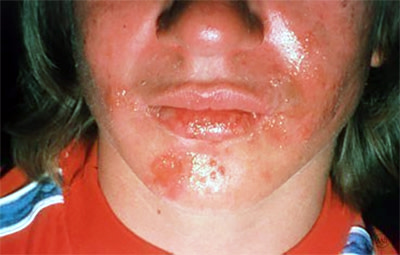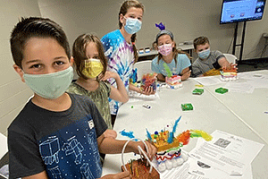Cold sores: Who gets and causes
Who gets cold sores?
The virus that causes cold sores is very contagious, so many people get cold sores.
In the United States, people usually get this virus when they are a child. Getting kissed by someone who has a cold sore is often how a child catches the virus.
A child can also get the virus by eating from the same fork or spoon as someone who has a cold sore or sharing a towel with a person who has a cold sore.
Adults also catch the virus. That’s why it’s so important for everyone who has a cold sore not to kiss people or have intimate contact until the cold sore forms a scab. To prevent infecting others, it’s also important to stop sharing personal items like towels and razors until the cold sores form scabs.
Cold sore outbreak
Some people have triggers that cause outbreaks of cold sore. A serious sunburn triggered this teen’s cold sores.

What causes cold sores?
A virus causes cold sores. Most cold sores are caused by the herpes simplex virus (HSV). More than half of Americans ages 14 to 49 carry this virus.
Once you get the virus that causes cold sores, you have it for life. After the sores clear, the virus travels to your nerves, where it stays unless it reawakens.
After getting infected, some people never get a cold sore. Others see some cold sores, but then develop antibodies to the virus and never get another cold sore. It’s also possible to get cold sores throughout your life.
Outbreaks tend to occur less often after 35 years of age.
If you get cold sores, it’s likely that something triggers the virus to wake up. The following can be a trigger:
Stress
Fatigue
Illness, such as a cold, fever, or flu
Injury, such as a cut, to the area where you have had cold sores
Dental work
Cosmetic surgery or laser treatment
Strong sunlight
Certain foods
Hormonal changes, such as getting your period
What triggers cold sores in one person may not trigger them in another person.
Image
Image used with permission of the American Academy of Dermatology National Library of Dermatologic Teaching Slides.
Reference
Fatahzadeh M and Schwartz RA. “Human herpes simplex virus infections: Epidemiology, pathogenesis, symptomatology, diagnosis, and management.” J Am Acad Dermatol. 2007;57(5):737-63.
 Atopic dermatitis: More FDA-approved treatments
Atopic dermatitis: More FDA-approved treatments
 Biosimilars: 14 FAQs
Biosimilars: 14 FAQs
 How to trim your nails
How to trim your nails
 Relieve uncontrollably itchy skin
Relieve uncontrollably itchy skin
 Fade dark spots
Fade dark spots
 Untreatable razor bumps or acne?
Untreatable razor bumps or acne?
 Tattoo removal
Tattoo removal
 Scar treatment
Scar treatment
 Free materials to help raise skin cancer awareness
Free materials to help raise skin cancer awareness
 Dermatologist-approved lesson plans, activities you can use
Dermatologist-approved lesson plans, activities you can use
 Find a Dermatologist
Find a Dermatologist
 What is a dermatologist?
What is a dermatologist?